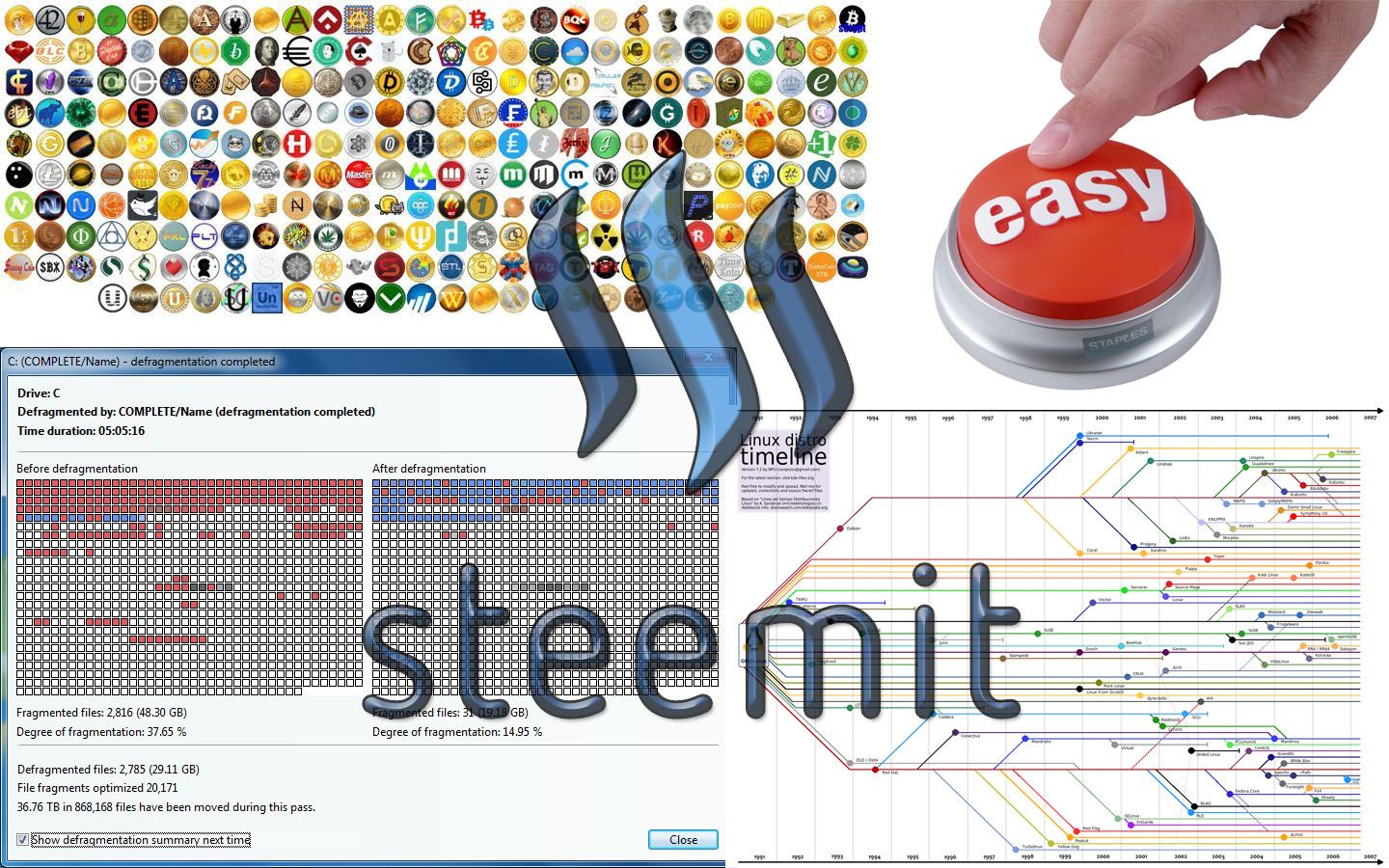Fragmentation can be a positive but it can also be detrimental... I see this as one thing holding cryptos and blockchains back...

I've watched a lot of different tech in my life. The best tech can sometimes have difficulty attaining mainstream adoption. One excellent example of this is Linux. Linux without a doubt is probably the best operating system available. Yet, it is still far from leading the mainstream. It is free. This means price is not really an issue, except for perhaps those people believe that nothing good will be sold for free. There are distros (aka distributions, or versions) of Linux that are not free. Linux is an open source operating system that was first created and given to the world by Linus Torvalds. It is a variant of UNIX. Thus where it's name comes from. It is open so the community keeps adding to it and adding more and more features. Yet distros also occur which is sometimes called a FORK. A group decides they are going to make Linux in a certain fashion using a certain set of design principles. This means installing something in Ubuntu (very popular distro today) is different from installing a similar thing in CentOS (another popular one for servers). The commands, where things go, etc is different. This means it is not as easy and straightforward as it could be. This ability to have many flavors is a strength in that they can each focus on specific audiences and they can each work towards solving different problems. The weakness comes from there being dozens of different distros. This creates fragmentation and confusion. It is not appealing to the average user. So while you can make Linux do virtually anything a Windows or Mac OS X machine does functionally, it is not always easy to know how, or which distro to use. This makes it daunting and less appealing to the masses. This has been improving some within the last decade or so. Ubuntu seems to be the most dominant distro when it comes to simple desktop OS, and gaming and such. There are others that come close. The server market still has quite a few different players with CentOS being a popular one, SUSE, Fedora, and others. I personally believe the only reason Linux has not long ago buried Windows and OS X is due to the fragmentation. There are too many people reinventing the wheel rather than focusing on supporting building the cars and things that can be made with an existing wheel.
Crypto and Blockchain
This is also a problem I see occurring with Cryptocurrencies and the Blockchain concept. I see the crypto scene as far more fragmented than the Linux fragmentation.
As people are talking about crypto currencies and blockchain being able to solve the problems what do they keep doing?
Instead of checking to see if there is already a blockchain capable of meeting their needs or a currency they create YET ANOTHER BLOCKCHAIN, and YET ANOTHER CRYPTO. I also see a lot of cryptos being created regularly that don't really offer anything beneficial in terms of a reason they exist. The advantage of creating what some people call as "shitcoin" is you can own a big chunk of coin for your creation and when people pump and dump the shit coins which seems to happen from time to time, the people who invented that shitcoin make some good money.
So while we CAN fix a lot of problems with blockchain and crypto, a big problem preventing its success is the desire to cash out and the people creating a new blockchain rather than building up upon existing ones.
With that said I see a few that seem to have some momentum or reason for existing. I do not consider myself even close to a crypto currency expert. I am really a novice as I have no interest in spending my time investing and watching the prices change like it is a game where the score is money. That turns it into just another job.
Bitcoin - it was the first it has the momentum. It is long in the tooth and has flaws, but it is huge and well established. It still seems to be the glue that bonds all other cryptos together. For now.
Ethereum - fragmented its own community with the DAO. The concept of smart contract is appealing, but does it need to be the only crypto to do this. It is faster than Bitcoin, but it also has flaws. I would say it's biggest negative at the moment is the fragmentation between Ethererum and Ethereum Classic. It may be find for crypto-enthusiasts. It is not fine for the average people, as that just adds more effort and confusion to navigate. People generally do not want that.
Dash - focusing on making it easy to use, and marketing. Those are things that can really reach the masses. It's master node system is also a little different, but is also confusing for the average person. The ease of use focus though could keep this one around for awhile and something like it could take over the duties as the glue that bitcoin currently provides.
Bitshares - It has a lot of potential, but I consider it a very pain in the ass to use. I've lost some currency just in trying to use it. If you log out of open ledger have fun spending many hours learning again how to log back in. It seems to have a ton of potential and it is running on top of graphene so it is fast. Yet right now it is a bit confusing to use and out of all of those I have listed it is the most difficult to use. When you are logged into Open Ledger or somewhere else it feels a bit alien, but it gives that impression that if you used it quite a bit that it would start to make sense. For mass adoption forcing users to change how they think is a bad design. You want to tweak your code and interface to make it easier for the average person to simply use it. If bitshares can address this then it could be a major solution. I am still pretty confused about this one.
Steem - (I'm not listing golos though that is similar) - based off of the graphene technology like bitshares it is the fastest chain (same as bitshares) out there. It is not open source. It has been working for over a year and already paying people. It's speed and extend ability seem to indicate when people are looking for blockchain solutions it is one of the first things they should consider developing for. You would be able to immediately tap into the existing steem economy rather than growing yet another crypto currency economy from zero and further fragmenting.
Inspiration
I saw that video after @andrarchy pointed it out to me on this post. This is just another example in a growing number of them of people saying Blockchain is a solution and then going out and creating ANOTHER blockchain and ANOTHER currency. This is the wrong way to do it. The average people do not want to have to keep track of dozens or hundreds of currencies.
This entire project in that video could have been done within steem now. It could have been done with other currencies as well.
We are ending up with a sea of partially built houses, as a foundation is laid, and beams start to go up, a person says "Hmmm... I wonder" and walks off to begin laying another foundation and throw up some more beams before bothering to complete the structure that was already there.
Can blockchain solve a lot of problems? Yes. People need to focus more though and stop trying to use their get rich quick schemes. It can solve a lot of problems, but to solve those problems we need to focus and avoid so much fragmentation.
A little fragmentation is okay as it fosters competition and innovation. Too much fragmentation though can stifle adoption and can stall progress.

Steem On!


Sorry I missed this earlier. I think you are spot on in many of the points you make. I love the house building analogy - it seems to be happening all over crypto and has been going on for at least the last 3 years +.
There is this "place" where decentralization (which can definitely be a positive) gives way to fragmentation, as you point out.
It has been one of my concerns about Steemit... we have this "social" site, and we have some levels of hope of bringing its awesomeness to the world. It's open source and blockchain based, and there are developers out there working on apps... but if we are to FUNCTIONALLY sell the idea of Steemit to a broader audience, the whole notion of "Steemit and 53 associated apps" is just not going to fly with a non-techy public. They will want "plug and play" social media under ONE "umbrella" called Steemit... not 53 independent apps that each do "a little bit" to enhance Steemit.
What's my point? All these improvements to Steemit MUST launch from inside one central User Interface (called Steemit) just like Facebook works... otherwise we end up exactly with fragmentation, and nobody will care.
Sorry, I sort of wandered a bit off topic, although this is a very specific form of fragmentation.
The apps could still have relevance if they are different types of things that do things steemit does not to allow you to USE steem as a currency... so you build an economy. Right now steemit is the gateway and the mining for putting currency into the economy. Using that currency requires translation typically to bitcoin and then potentially from there into fiat.
As enough things arose centered around steem there could be many things you may not need to do any conversion at all.
Yet I also see people saying BLOCKCHAIN can be a solution and then creating something new rather than leveraging what is already here. I know of no NEW blockchain solution that is superior to steem/graphene.
Yes, I see what you're saying... and having more "economic reasons" (as opposed to just "investment reasons") for Steem is definitely a plus.
The whole fragmentation thing strikes me as a lot of reinventing the wheel... "Hey, look! Get our new and improved wheel... it's WHEELIER than the other wheels!" Still looks round to me... still does the same basic thing. "But we just tested ours at 43 trillion transactions per second!!" Hmmm... and I should care, when I can't even use your coin to buy one cup of coffee, anywhere on the planet?
Call me cynical, but it seems like there's a lot of genius out there... living in a strange echo chamber. Patting themselves on the back (figuratively speaking) for having boosted the engine in their Ferrari from 600 to 800hp, while being oblivious to the fact that the car (a) has no wheels and (b) they live in a remote village in Alaska that has a total of 500 feet of paved road.
And most of the time the reinvented wheel is not actually better, but yes that is exactly what I was getting at.
It is more like... "did you hear that X made Y because he made a wheel?"
"I should invent a wheel too rather than use the ones already out there..."
"Come buy my shit wheel!"